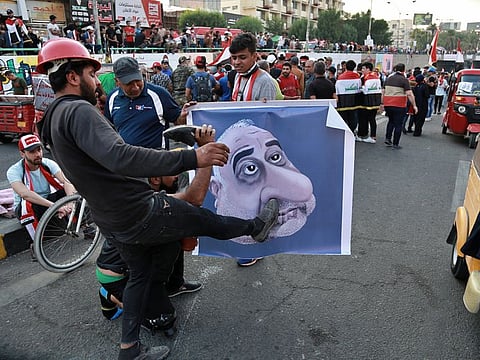Iraqi PM calls for return to normalcy amid mass protests
Adel Abdul-Mahdi calls for markets, factories, schools and universities to reopen

Baghdad: Iraq’s prime minister on Sunday called on anti-government protesters to reopen roads saying “it’s time for life to return to normal,” after a month of massive rallies demanding wide-ranging political change.
In a statement, Prime Minister Adel Abdul-Mahdi called for markets, factories, schools and universities to reopen after days of protests in the capital and across the mostly Shiite south.
He said the threat to oil facilities and the closure of roads had cost the country “billions” of dollars and contributed to price increases that affect everyone.
Tens of thousands of protesters have gathered in Baghdad’s central Tahrir Square and across southern Iraq in recent days, calling for the overhaul of the political system established after the 2003 U.S.-led invasion.
Protesters have also taken over a large tower in the square that was abandoned after it was damaged in the war.
Thousands of students have skipped classes to take part in the street rallies, blaming the political elite for widespread corruption, high unemployment and poor public services.
Earlier Sunday, protesters blocked roads around their main protest site with burning tires and barbed wire, unfurling a banner at one roadblock reading: “Roads closed by order of the people.”
They appeared to be borrowing a tactic from Lebanon, where similar anti-government demonstrations have been underway since Oct. 17, and have repeatedly blocked major roads in order to ramp up pressure on authorities.
Security forces have fired tear gas, rubber bullets and live ammunition at the protesters, killing at least 256 people in two waves of demonstrations since early October.
Since the protests restarted on Oct. 25 after a brief hiatus, there have been near-continuous clashes on two bridges leading to the heavily fortified Green Zone, the headquarters of the government and home to several foreign embassies.
In his statement, Abdul-Mahdi differentiated between peaceful protesters, who he said had turned the demonstrations into “popular festivals” that bring the nation together, and “outlaws” who he said had used the demonstrators as “human shields” while attacking security forces.
The prime minister had met with top security officials late Saturday.
The Iraqi High Commission for Human Rights meanwhile said Siba al-Mahdawi, an activist and physician who has taken part in the protests, was abducted on Saturday night by an unknown group.
The semi-official body called on the government and the security forces to reveal her whereabouts. Al-Mahdawi was one of several doctors who have volunteered to provide medical aid to the protesters.
Last week, President Barham Salih said Abdul-Mahdi is willing to resign once political leaders agree on a replacement.
He also called for a new election law and said he would approve early elections once it is enacted.
In a meeting with the heads of trade unions on Sunday, Salih said the new election law would be submitted to parliament this week.
Abdul-Mahdi’s statement did not say anything about resigning, and even if the new electoral law is quickly approved, the process of holding elections and forming a new government could take several months.
Meanwhile, the protests have only grown since the president’s initial announcement.
On Sunday, a 24-year-old veterinary student attended the demonstrations in Baghdad carrying a cat, with a sign around its neck reading “I am coming to demand my rights.”
The student, who did not give her name for fear of repercussions, joked that she was willing to treat the country’s politicians for free.
Iraq is governed by a sectarian political system that distributes power and high offices among the Shiite majority, Sunnis and Kurds.
It holds regular elections, but they are dominated by sectarian religious parties, many of which have close ties to Iran.
The political parties divvy up ministries and then hand out jobs to their supporters, contributing to a bloated public sector that is unable to provide reliable services.
More than 15 years after the U.S.-led invasion that overthrew Saddam Hussein, Baghdad and other cities still see frequent power cuts, the tap water is undrinkable and public infrastructure is crumbling.
Few Iraqis have seen any benefit from the country’s oil wealth, despite it being an OPEC member with the fourth largest proven reserves in the world.



